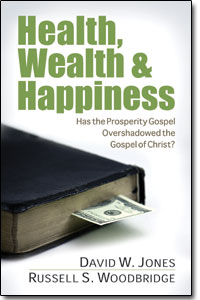 David W. Jones and Russell S. Woodbridge, Health, Wealth and Happiness: Has the Prosperity Gospel Overshadowed the Gospel of Christ? (Grand Rapids, MI: Kregel Publications, 2011). Paperback / Kindle
David W. Jones and Russell S. Woodbridge, Health, Wealth and Happiness: Has the Prosperity Gospel Overshadowed the Gospel of Christ? (Grand Rapids, MI: Kregel Publications, 2011). Paperback / Kindle
Health, Wealth and Happiness by David W. Jones and Russell S. Woodbridge offers both a critique of prosperity theology as well as an exposition of what the Bible really teaches about suffering, wealth and poverty, and giving. Regarding the critique, it identifies major theological errors in prosperity theology without concluding that adherents are not Christians. And regarding the exposition, its approach outlines biblical teaching in the context of salvation history, i.e., creation, fall, and redemption.
As a minister, I would use this book in several ways. First, I would recommend it to my congregation for reading. Second, I would use it to help outline a sermon series on prosperity theology. The twofold movement of “critique” (Part 1) and “correction” (Part 2) is a helpful way to organize the movement of your sermons. Show the errors first, then show the truths. Moreover, the next time I preach on 1 Corinthians 16:1–2 or 2 Corinthians 8–9, I plan on borrowing Jones and Woodbridges’ principles of giving: Giving should be periodic, personal, planned, proportionate, and plentiful (pp. 154–155). Third, I would encourage Sunday school classes and small groups to use it as the basis of a 6-week curriculum. This is an ideal book for group use: It is short, irenic, thought-provoking, and readable.
That doesn’t mean I agree with everything Jones and Woodbridge write. For one thing, as a Pentecostal, I affirm the doctrine of healing in the atonement, while they don’t. Christ’s death and resurrection reconciles us to God both spiritually and physically. For some, this healing happens “now”; for others, it has “not yet” happened but will. The question, it seems to me, is not whether healing is provided for in the atonement but when it will occur.
Indeed, one of the major problems of prosperity theology—oddly unmentioned by Jones and Woodbridge—is its overrealized eschatology. While believers experience tokens of the New Heaven and New Earth in the present, they will experience the fullness of these things in the future. Prosperity theology promises more than the Bible (and Christian experience, for that matter) says will be delivered in this lifetime.
Third, it seems to me that we need to stop thinking of prosperity theology as one set of beliefs. Jones and Woodbridge note that prosperity theologians differ among themselves. For example, hardcore Word of Faith theology is different than, say, Joel Osteen’s “prosperity light” theology. I would add that the word prosperity itself means different things to different people. To a middle-class North American, it means a Mercedes and a bigger house. To an African eking out a subsistence living, it means having enough to live one, and then some. Perhaps we should start talking about prosperity theologies in the plural and recognizing that a one-size critique does not fit all of them.
That brings me to a fourth and final point: Perhaps so many people find prosperity theology (of one kind or another) attractive precisely because we have de-emphasized what the Bible teaches about bodily health and material wellbeing. It’s one thing for already-rich North Americans to look askance at televangelists who preach what amounts to slick defenses of gluttony. (Our North American social context is where Jones and Woodbridge’s critique works best.) It’s another thing for “the wretched of the earth” to read the Bible’s robust promise of provision and healing in Matthew 6:18–34 and James 5:13–16 and then to believe them. Shouldn’t we be be careful lest, in pooh-poohing the faith of these Majority World believers—most of whom adhere to some version of prosperity theology—we teach them to become people of “little faith”?
P.S. If you found my review helpful, please vote “Yes” on my Amazon.com review page.

